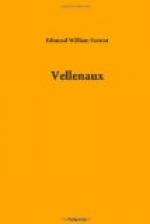Nor was the reverend lover subjected to any trials of a similar nature; he was an orphan, with but one near relative, a bachelor Uncle, who was fond of his nephew, and proud of his talent and the position he had attained as Rector of Vellenaux. The old gentleman had intended to leave him his property, amounting to some five thousand pounds, in the five per cents., at his death; but the kind-hearted relative on learning that his brother’s son had secured so estimable a lady for his wife; belonging to a family who for so many years had resided in the neighborhood of Vellenaux, the scene of the young Rector’s labours; he altered his will, placing half of the original sum to Charles Denham’s credit, at Drummond’s Bank in London, subject to his cheque or order, so that the rectory could be furnished and fitted up with all the requisites befitting the position of the young couple.
It was a right joyous group that gathered around the wedding breakfast table at 54 Harley Street, on that bright summer morn, that saw Emily Barton made the happy bride of the equally happy Rector of Vellenaux. A friendly Bishop tied the connubial knot in one of the most aristocratic churches in London, and a few hours afterwards Emily and Charles departed, not by rail, to some uncomfortable foreign hotel, but by travelling, carriage and post horses to their home at Vellenaux. For the guests who had assembled to witness the wedding ceremony, there was another treat in store, they were invited to a ball given in honor of the occasion by the brother of the bride, at his mansion in Berkly Square, concerning which more anon.
The term for which the Willows had been rented, now expired, and Horace determined to no longer delay his departure for Devonshire. This had been ever in his mind while serving in India. He loved the old place and there were now fresh inducements for him to give up the house in London, and repair to the Willows. His brother Tom was married and settled at Vellenaux, and Emily had just become the wife of the rector, and lived within a stone’s throw of her old home. Thus, with the visits of his aunt and the Ashburnham’s, Pauline would not be without society; besides he would take her and Edith, whom he now looked upon as a sister, to London during the height of the gay season, and this he thought would not fail to please all parties.
Mrs. Barton was to give a farewell entertainment prior to her departure, which should exceed anything that she had hitherto attempted, and the evening of the day of Emily’s marriage was fixed for the occasion.
It was somewhat late in the afternoon when Captain Carlton and Doctor Draycott reached London, where the two friends and travelling companions parted—Draycott for his father’s house in Finsbury Pavement, and Carlton for his hotel in Bond Street. His first idea was to go direct to Berkly Square and inform Edith and the Bartons of the death of Sir Ralph, and the declaration he had made concerning the will of the late Sir Jasper; but while waiting in the coffee room of the hotel, looking over the morning paper, he chanced to hear the following conversation between two gentlemen standing at the bow window that looked out on the street.




